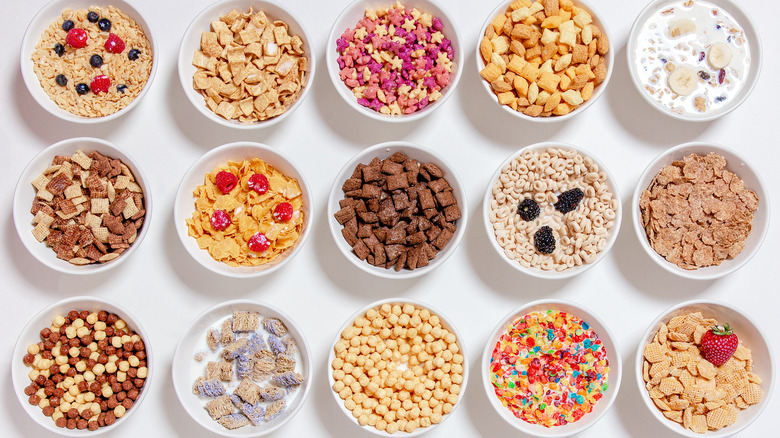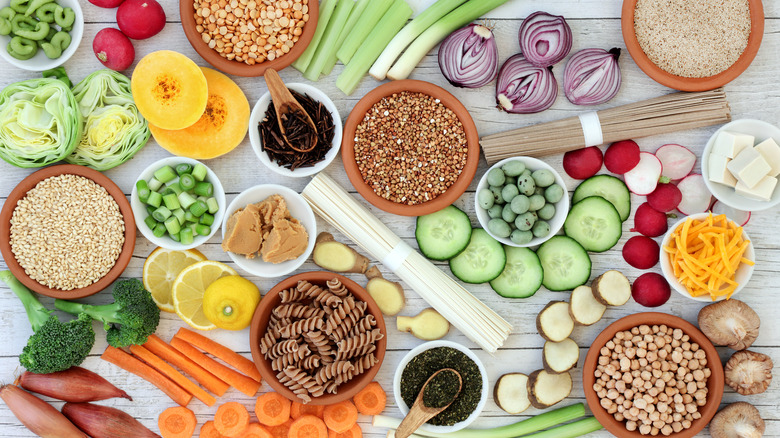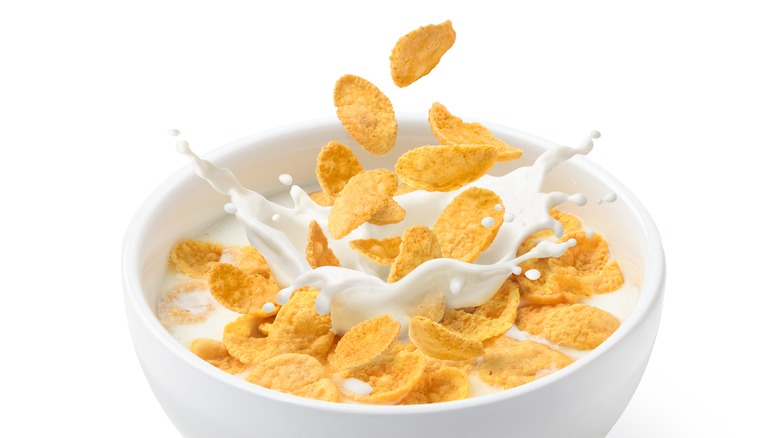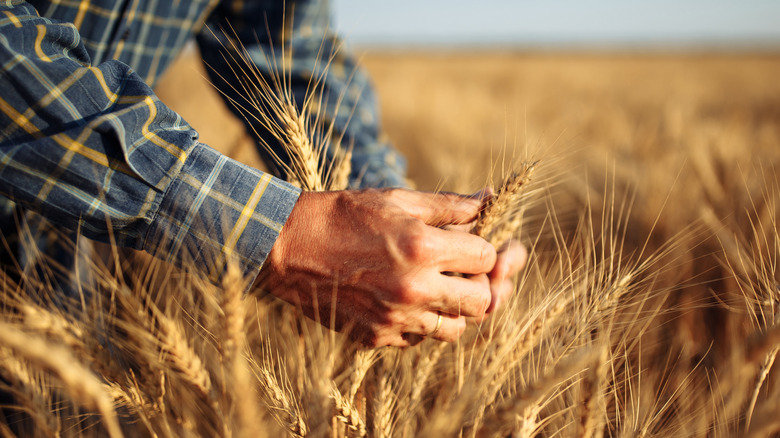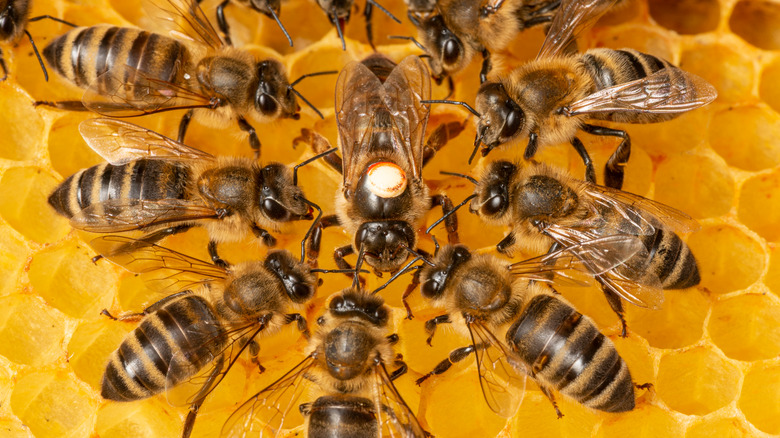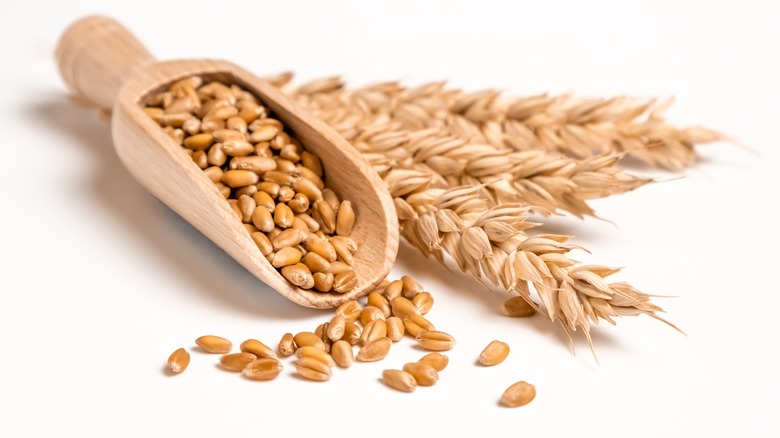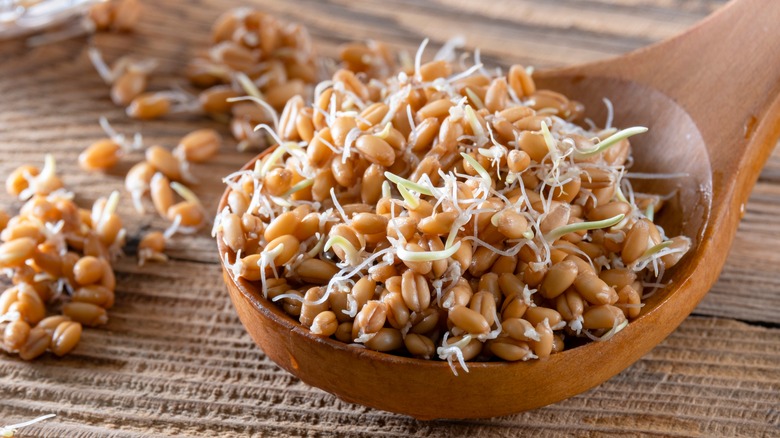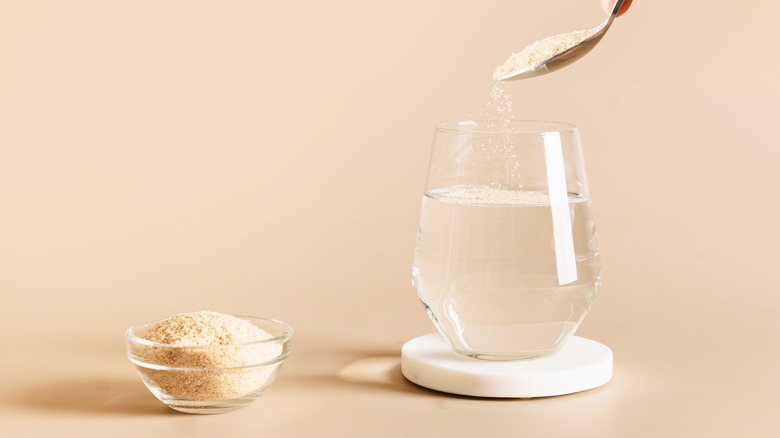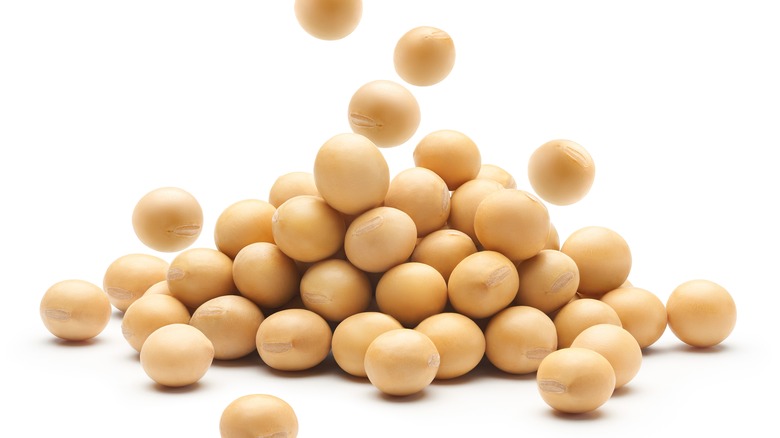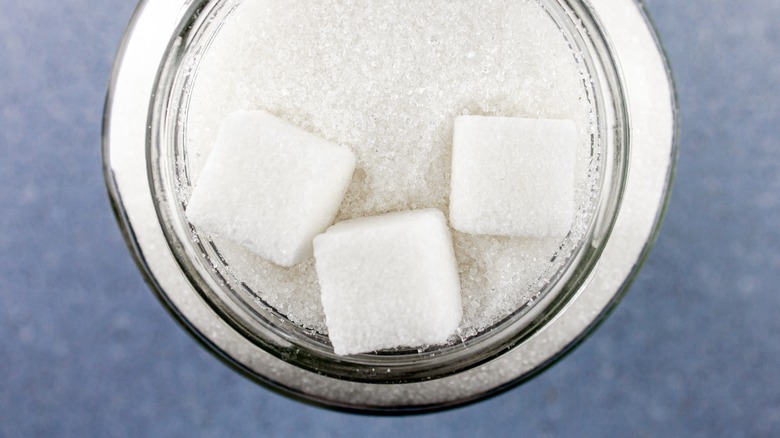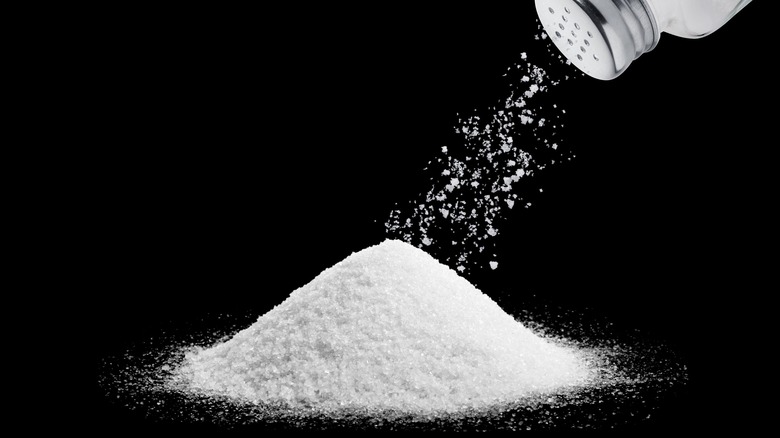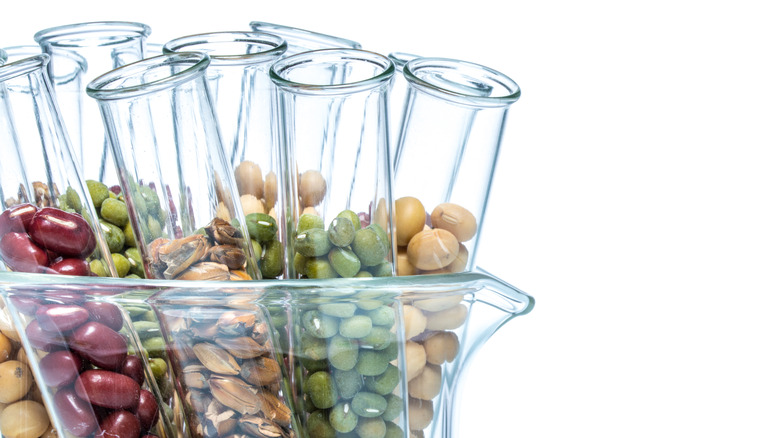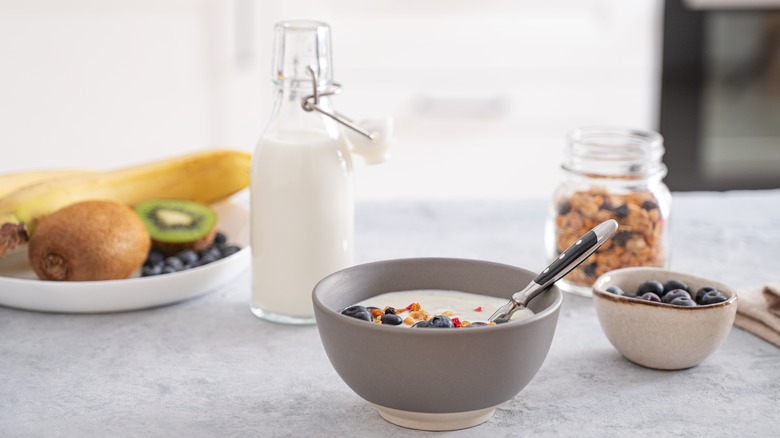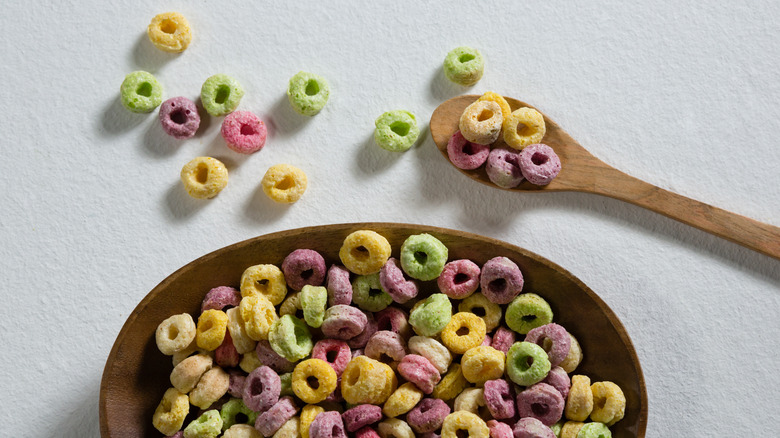The Reality Behind Kashi
When you're pressed for time, it's always good to have a healthy snack ready on hand. And hey, pouring a bowl of dry cereal or unwrapping a granola bar can make you feel so much better when you know that it's made from a blend of whole grains and other all-natural ingredients, providing you with fiber, protein, and other nutrients that will power you through your day. But when your favorite type of cereal makes bold marketing claims, how much of those claims can you really believe?
In the case of Kashi, you can actually take a lot of confidence in your choice. Kashi is a brand known for making products with a blend of whole grains, which come with a lot of health benefits. But there are some aspects of the brand that have been overhyped — and as with any product or brand touted as "healthy," it's wise to use a little bit of discretion. Read on to learn the reality behind Kashi.
Kashi was inspired by kosher eating and macrobiotic diets
According to Kashi's own website, the brand's name is actually a mashup of two other words: Kashtruth, which refers to the practice of eating kosher, as well as the name of Michio Kushi, the Japanese philosopher who encouraged people to follow a macrobiotic diet. These healthy eating principles inspired California residents Gayle and Philip Tauber to join the growing health food movement in 1984. They released their own brand that would reflect these ideals and promote living in a way that was healthy not only for the human body, but also for the planet.
For those wondering about the health benefits of eating kosher and macrobiotic, it's worth noting that kosher is a Jewish tradition that specifies how certain foods must be raised and prepared. As WebMD notes, this can mean certified foods have ingredients that are strictly regulated. A macrobiotic diet emphasizes whole grains, vegetables, and beans, with moderate consumption of foods like fruit, white fish, seeds, and nuts while avoiding foods like meat, dairy, eggs, and refined sugar (via The Permanente Journal).
Kashi is a subset of the Kellogg's brand
Unfortunately, sometimes bold innovation works best on a smaller format, as was the case with the Kashi brand. As Kashi started to establish a name for itself, it was acquired by the cereal company Kellogg's; this eventually led to a lot of compromises on what made the Kashi brand unique, according to ZDNet.
It all started out well enough: Kellogg's acquired Kashi and continued to let the small company do its own thing, with young people in management positions and not a lot of big corporate ideas forced onto it. Kashi grew over the years, and launched more than 15 products into the market. By 2008, Kashi was pulling in about $600 million. But eventually, Kellogg's started to enforce its own way of doing things on Kashi: The brand's products began to be made with genetically modified organisms (GMOs) or ingredients that weren't organic.
Customers who liked Kashi because of the ingredient lists that they'd gotten used to started to distrust the brand. Kellogg's pivoted in 2014 with the hope to regain that customer base — but as many can undoubtedly attest, once trust is lost, it can be a tough thing to reclaim.
Part of Kashi's brand identity is geared toward helping farmers
Making the shift to organic farming can be tough, but Kashi makes a point of helping farmers with the transition, as Supermarket News explains. The big problem is that the investment in organic farming practices can be expensive. Moreover, it's hard to make a profit during this transition period, because even though farmers are paying for organic farming practices, their crops are not yet able to be certified organic, so they can't sell them at the typical price point seen on organic produce. This is especially hard on wheat farmers: Wheat doesn't yield as much revenue as fruits and vegetables, but can be a very vulnerable crop when it comes to various diseases. That's why wheat farmers making the transition to organic practices could lose a lot of the wheat they grow.
To support this important move many farmers are making, Kashi uses ingredients that are Certified Transitional rather than Certified Organic. This pertains to products made from wheat that, while grown via organic practices, has not completed the 36-month transition needed to be certified organic.
Kashi strives to help in honeybee conservation
As Sustainable Brands points out, 87% of people say they prefer to buy products from companies that support causes they care about. In the case of Kashi, it's not just the farmers that the brand supports.
Kashi makes a point of implementing practices that protect honeybees, too. This is primarily because honeybees are pollinators. That means they are crucial in sustaining the growth of many food production systems. In fact, more than one-third of the entire world's food supply is dependent on pollination via honeybees. In other words, without honeybees, crops simply won't grow.
In 2018, Kashi was one of four concerned organizations in the food industry — alongside the Honey Bee Health Coalition, Project Apis m., and the University of California — that encouraged sustainability practices with four guidelines: supporting pollination research, collaborative shareholding, expanding habitat programs and bee health funds, and being better about sourcing. For Kashi, this means avoiding the use of any pesticides or antibiotic residue on its products.
Kashi's products include a variety of whole grains
The macrobiotic diet, which served as part of the inspiration for the Kashi brand, encourages whole grains as a base for its way of eating. Unsurprisingly, Kashi certainly fits in well with such a diet.
As Stack explains, Kashi products contain a notable amount of whole grains. Most of them have about 13 grams per serving, although some products have up to 36 grams. The standard for a serving of whole grains is 16 grams, more than the average American eats in a day (even though they should be eating half of their recommended three to five servings of grains every day from whole sources). Eating whole grains offers a variety of health benefits, including better weight management and reduced risk of conditions such as heart disease and cancer.
Whole grains are also full of nutrients that you typically won't find in their refined counterparts. The cereal Kashi GO Crunch, for example, is made with what's known as the Kashi Seven Whole Grains and Sesame Blend: certified transitional hard red wheat, brown rice, barley, triticale, oats, rye, buckwheat, and sesame seeds.
Some of Kashi's products have sprouted grains
Kashi products contain plenty of whole grains, which is considered healthy in and of itself. Some of those whole grains are actually sprouted whole grains (like in the Kashi Organic Promise Sprouted Grains Cereal). Per the cereal's marketing, it's made from 100% sprouted whole grain flakes, specifically the whole grains wheat, brown rice, oats, barley, spelt, and amaranth (via Mr. Cereal).
As Harvard Medical School explains, sprouted whole grains get their health boost over regular whole grains because the grains have already started the germinating process (which is why they have sprouts). During germination, some of the grain's starch content breaks down, resulting in a greater concentration of nutrients. When you eat sprouted whole grains, you'll be enjoying the benefits of nutrients such as folate, iron, vitamin C, zinc, magnesium, and protein. Furthermore, the germination process breaks down phytate, an acid that hinders your body from absorbing some vitamins and minerals.
Kashi's products also contain supplemental fiber
The whole grain found in Kashi products is naturally a great source of fiber, which your body needs for optimal digestive health, as well as healthy weight and cholesterol levels. But the makers of Kashi must have felt like the fiber found in whole grains wasn't enough, as some of their foods contain fiber additives.
Kashi GO Crunch, for example, contains chicory root fiber as its fifth ingredient, after the brand's signature whole grain blend, soy flakes, and sweeteners (in the form of brown rice syrup and cane sugar). Chicory root fiber, also known as inulin, might present a problem for some consumers. Reuters explains that inulin is found in many commercial health foods. Although it is generally well tolerated, it can have unpleasant side effects for some, which many include flatulence, bloating, diarrhea, constipation, and stomach cramping or rumbling.
But how much is too much inulin, really? According to a study cited by Reuters, try to stick with fewer than 10 grams of inulin per day.
Kashi boosts its products' protein content with soy
When you think of breakfast cereal, carbohydrates might be the first thing that comes to mind. Interestingly, some Kashi products are also a great source of protein, such as Kashi GO Original, which contains 11 grams of protein per serving.
Although some of the protein content of Kashi's products can be attributed to the whole grains found in them (which are a richer source of protein than their refined counterparts), there is an ingredient that gives the protein count a boost: soy protein concentrate. This concentrated form of protein is derived from soybeans.
The National Center for Complementary and Integrative Health (NCCIH) points out that although soy is celebrated for its many health benefits, it may present a few cons for some consumers. For instance, soy protein could lower cholesterol levels when you consume it instead of other protein sources (e.g., animal products). But there are some side effects to soy consumption as well (primarily, digestive upset). That said, the NCCIH says that unless you have an allergy to soy, it is an ingredient you can consider safe to eat.
Kashi's products can contain a lot of sugar
When you pour a bowl of Kashi cereal, you might be surprised how pleasantly sweet it is, despite the impressive list of whole grains it contains. But that sweetness isn't an accident.
Aside from the signature whole grain blend, another prominent ingredient in Kashi products is sugar, as Stack points out. While this sugar might be in the form of the more appealing-sounding brown rice syrup or dried cane syrup, you shouldn't let yourself be fooled: Added sugar is added sugar, and Kashi cereals contain a lot of it. Most of the products range between 9 and 13 grams of sugar, the same amount you would find in a mainstream sweet cereal aimed at children like Reese's Puffs Cereal (yes, let that thought sink in: Kashi has the same amount of added sugar as Reese's Puffs). That's not ideal, considering how women should only be consuming 26 grams of sugar per day, while men should aim for 36 grams of sugar per day (per the American Heart Association). In other words, a single serving of Kashi cereal could already be half your daily recommended amount of sugar consumption.
Most of Kashi's products are low in sodium
Kashi products may be pretty sweet, but at least they're not terribly salty. Kashi bars, in particular, have notably less sodium content compared to other snack bars and granola bars on the market, though it's important to pay close attention to which bars you are choosing (per I Am Going Vegan).
For example, a Kashi Dark Chocolate Coconut bar has only 25 milligrams of sodium. The Peanut Butter Chocolate (Grain Free) bars contain 40 milligrams, while the Coconut Almond (Grain Free) bars have 45 milligrams. These are way below the recommended limit of 2,300 milligrams per day, making them easier to fit into your daily diet. And although some Kashi bars are significantly higher in sodium — like the Chocolate Almond Sea Salt bar, which has 125 grams — the risk of you exceeding your sodium intake by eating these bars isn't that high.
The Centers for Disease Control and Prevention cites processed foods as being one of the most prominent sources of sodium in the American diet. High sodium intake put you at an increased risk of cardiovascular problems like high blood pressure or stroke.
Are Kashi's products truly all-natural?
When Kashi was acquired by Kellogg's, some loyal customers became disenchanted with how the brand appeared to compromise on some of its key characteristics — including the use of genetically modified ingredients (via HuffPost).
Genetically modified organisms (GMOs) have been a hot topic among health experts and individuals desiring to live a healthy lifestyle. Typically, organisms are genetically modified to make them better able to survive the things that can kill them, like drought or pests. While this may sound beneficial, many consumers are hesitant to buy GMO products due to the possibility of unhealthy side effects.
With that said, Kashi's "all natural" marketing claim isn't exactly dishonest. As ABC News explains, "natural" isn't a regulated term — unlike the term "organic," which is) — meaning Kashi can call its products "all natural" even if they contain GMOs. Still, Kashi pledged to ensure that 70% or more of the ingredients in its products would be certified organic.
Eventually, Kashi opted to remove the terms "all natural" and "nothing artificial" from its product labels and marketing, but for an entirely different reason. According to WebMD, this was due to the company's use of several not-so-natural ingredients in its products, including pyridoxine hydrochloride and calcium pantothenate. Additionally, some of the soy oil in Kashi's products was processed using hexane, a compound found in gasoline.
Watch out for the health halo
If you're pouring a bowl of Kashi cereal or unwrapping a Kashi granola bar, you might take some pride and satisfaction in the idea that you're making a healthy choice. After all, they're made with whole grains and provide decent amounts of fiber and protein (despite their sugar content). Be careful, though, lest you allow yourself to be fooled by the so-called "health halo."
Simply put, the health halo refers to the way we perceive some foods as healthy. According to the Food Network, this may lead to us making some particularly unhealthy choices. This tends to happen with products that have marketing claims like "all natural" (as Kashi did for a while) or feature organic ingredients (like many Kashi products now do). When consumers see these terms on Kashi's products, they may automatically categorize said products as "healthy," which can lead to overconsumption — and when they exceed the recommended serving size, they end up consuming more calories than they need.
Is Kashi truly better than most cereals?
Kashi does a great job of marketing itself as a healthy option. But how does it compare to other options out there on the grocery shelf?
A blog post from the New York Times points out that Kashi has more sugar than Cheerios, but its high fiber content helps offset the effects of those carbohydrates on your blood sugar. Therefore, you are unlikely to experience the crash that you would normally undergo after eating other processed cereals. According to Coach Levi, it's better than the sugary stuff that's marketed toward kids — you know the kind he's talking about — so at least Kashi has that going for it.
Ultimately, though, Kashi isn't that much better than other processed, flavored, and even slightly sweetened breakfast cereals. In fact, your best options when it comes to breakfast are steel-cut or rolled oats, which are unprocessed and contain no unnecessary additives (though adding a bit of sugar to your bowl wouldn't be that bad).

